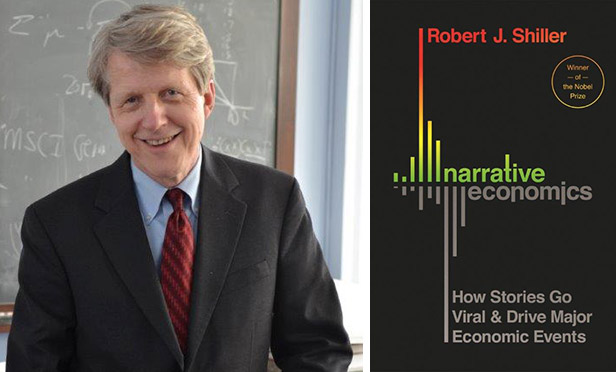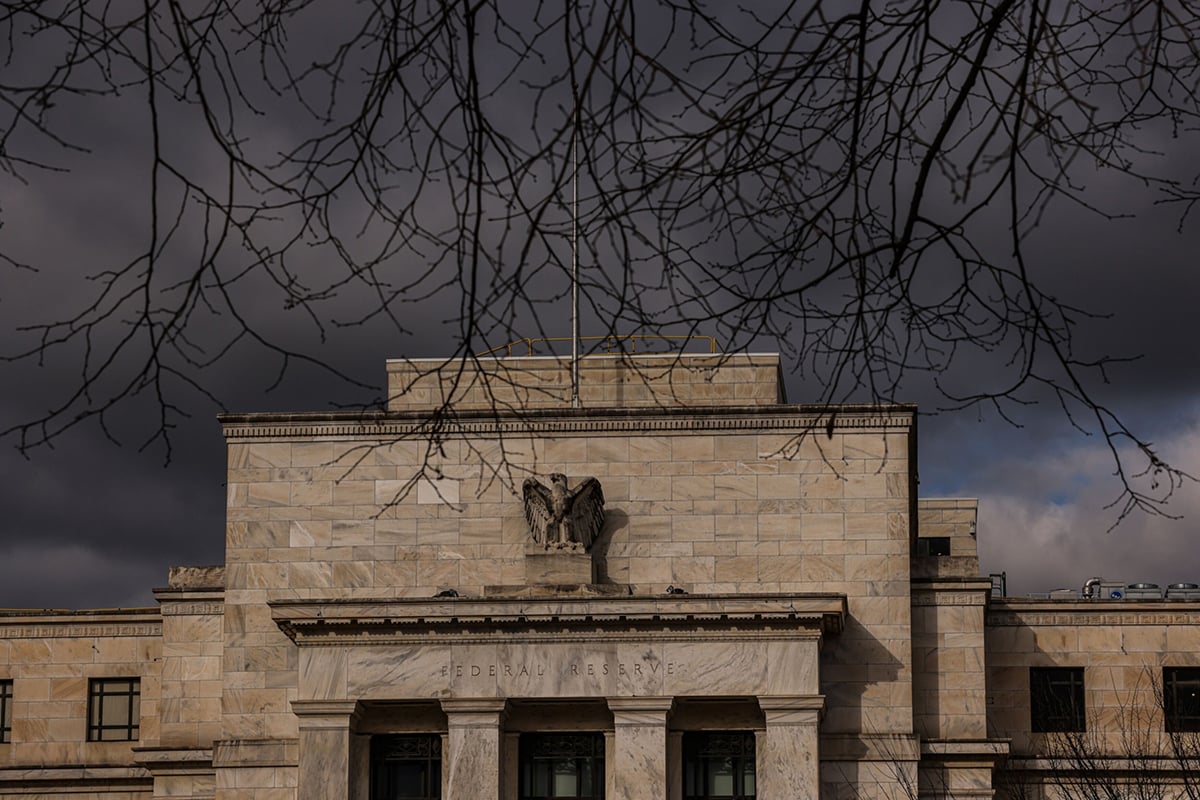 Nobel Prize-winning economist RobertShiller and his new book.
Nobel Prize-winning economist RobertShiller and his new book.
Popular stories that go viral aren't always frivolous. Some canmove markets and drive decisions about how and when to invest. Inan interview with ThinkAdvisor, a sister publication to Treasury& Risk, Yale economics professor and Nobel Prize winnerRobert Shiller argues for economists to pay more attention to whathe terms "narrative economics." As social media has expanded thevolume and contagion of popular narratives, some have grown intofull epidemics that "can change the economy's direction," Shillermaintains.
|The bestselling author of "Irrational Exuberance" (2000), who predictedthe dot-com debacle and the housing crisis, has a new book titled"Narrative Economics: How Stories Go Viral andDrive Major Economic Events." Joint winner of the 2013 NobelMemorial Prize in Economic Sciences with Eugene Fama and Lars PeterHansen, Shiller is also an entrepreneur: Since 2010, he hascollaborated with Barclays Bank on a series of equity-sectorindexes, which he and the firm design. In 2012, they introduced theShiller Barclays CAPE Sector Index Family.
|ThnkAdvisor recently spoke with him, on the phone from hisoffice at Yale. Here are highlights of our interview:
||
ThinkAdvisor: What's the difference betweenbehavioral economics and narrative economics?
|Robert Shiller: Behavioraleconomics usually tries to look at established human traits toexplain why people make mistakes. Narrative economics looks at howpeople change opinions that affect their actions and how thesespread from one person to another.
||
TA: Just what is an economicnarrative?
|RS: Typically, it's an illustrativestory, often involving celebrities. The stories are frequentlypatriotic and sometimes heighten a sense of injustice, or makepeople angry or make them laugh. They have to be contagious [goviral]—spread by newspapers, magazines, TV, social media—to succeedas narratives.
||
TA: Does the celebrity component make anarrative more contagious?
|RS: Yes—and more dramatic. In his1933 inaugural address, Franklin D. Roosevelt said, "The only thingwe have to fear is fear itself," which was an interpretation of theGreat Depression. But he wasn't the first to say that. One of theothers was the assistant to the mayor of Boston, who nobody hadever heard of. So the guys that said it before Roosevelt didn't cutit. But when he said it before a crowd of hundreds of thousands, itwas a story that people remember to this day.
||
TA: Do narratives have to be true?
|RS: No. It may help [contagion] ifthey aren't because rarely do people check the facts. They justrepeat what they've heard. [However], narratives can be true. Theycan point out facts that haven't been paid attention to, and thatcan affect people's judgment.
||
TA: For example?
|RS: The Great Depression was anarrative that exploded during the financial crisis [2008–2009].People already knew that narrative, but it became contagious againwhen it seemed that maybe [another deep depression] was happening,which caused them to curtail their spending.
||
TA: What's a modern narrative that's goneviral?
|RS: The Trump narrative, which hasreally taken over. He developed and perfected this narrative overhalf a century. It is: The ideal man isn't afraid to show off. He'sadorable to women. This impresses a lot of men who like to imitatemen that are followed by a trail of beautiful women. Trumpdeveloped this narrative, including the story that he isn'tpolitically correct—that he would speak the truth—and thateverything you heard out of Washington was a pack of lies.
||
TA: What are the implications of hisnarrative?
|RS: One thing it seems to mean isthat you don't have to worry about modesty. So people are willingto spend money extravagantly and feel like they have to becauseTrump's attitude toward losers is dismissive—they're worthless.
||
TA: Regarding the impeachment inquiry,Trump insists he's done nothing wrong and that he thinks he has theright to do whatever he wishes in executing the office ofpresident. Is this a narrative?
|RS: It's part of a constellation ofnarratives. People just seem to relish telling stories about Trump.It's probably his audacity, but he has an instinct of what is atellable story. He knows that being a self-made billionaire is verycentral to his story. That's why he doesn't want to release his taxreturns—it might raise questions about whether he really is aself-made billionaire.
||
TA: What's another Trumpnarrative?
|RS: If you try to discuss somedetails of government regulation, that would be boring, and peoplejust wouldn't care. But if you talk about wanting to kill tworegulations for every new regulation, that's the Trump narrative.It's more tellable.
||
TA: Can narratives help economists in theirforecasting?
|RS: I think they've helped me. Iwrote "Irrational Exuberance" in 2000 because I thought thenarratives of the time were extravagant, when the stock market wasat its highest level ever relative to long-term earnings. For thesecond edition of my book, which came out in 2005, because I waslistening to real estate narratives, I added data that I collectedon U.S. home prices going all the way back to 1890. The[narratives] were a foreshadowing of the financial crisis becauseit seemed that everybody—both homebuyers and lenders—believed thathome prices would [keep going] up.
||
TA: You argue that narratives' contagionneeds to be incorporated into economic theory. Why?
|RS: Policymakers have to makejudgments about narratives because often the impact of theirdecisions depends on these stories. The strength and radical-nessof their decisions are informed by their ideas of how dangerous asituation is. It would help if evidence were presented aboutnarratives.
||
TA: Some narratives may actually generatevery little talk, you point out. Such as?
|RS: They can be in the background,like this human interest story: Influenza in the U.S. is dormantright now, but you should get your flu shot because the flu iscoming, and there are forecasts it will be a bad flu season.Australia had a severe flu epidemic this summer [when it was winterthere]. In this [narrative] Australia is a leading indicator forthe U.S.
||
TA: The latest wave of consumertechnology-based fears began around 2016 and continues unabated,you write. You cite the current narrative of people fearing thatmachine learning and artificial intelligence will replace humanintelligence. Please elaborate.
|RS: I was amazed how far back I could[find] stories about this. It went all the way to Homer's "Iliad,"written in 700 B.C. He talks about a self-driving vehicle. In 1920there was a play, "R.U.R." ["Rossum's Universal Robots"] aboutrobots taking over the world and killing us. That idea stuck withus: These things seem to be our friends, but they might be ourenemies. It's a perennial narrative. Now that we have voicerecognition and voice actuation, the emphasis is that [robots will]replace human intelligence. That your job might be replaced by amachine is scary for practically anyone. The question is: Why isn'tit scaring the consumer more right now?
||
TA: Why do you think?
|RS: I don't have an explanation whyconsumer demand has held up so well in the U.S. while otheradvanced countries seem to be falling into recession. Economistsare too afraid of interpreting people's motives, so they rely onthe assumption that they're logical, rational, and consistent—whichis OK for some uses, but it's not perfect. Not many peopleforecasted the Great Recession because maybe they were thinking tooabstractly and weren't watching what [consumers] were saying.
||
TA: Can narratives be applied when makinginvestment decisions?
|RS: Rather than using narrativesdirectly, they're more for understanding why, for example,sometimes assets are overvalued and other times, they'reundervalued. But one can look at investments and decide they'rebeing supported by narratives rather than sound prospects.Narrative economics seems to require human judgment to implement.Are the stories sound? Where do they come from? [That is], youmight want to stay away from some of these investments.
||
TA: There's a famous story about ashoeshiner's giving stock tips to a prominent investor. Most peopleknow that narrative because it's been highly contagious. Yourthoughts?
|RS: That narrative involves [one ofthese]: John D. Rockefeller, Joseph Kennedy Sr., or [financier]Bernard Baruch. One of them, on the advice of the shoeshine boy,sold stock before the 1929 peak and made [a great deal of money] inthe crash. I traced this narrative to about 1911, when it wasn'tabout a shoeshine boy. But it was the same idea: Someone in a lowlyprofession was giving stock tips, and that was a sign to getout.
||
TA: You write that former Federal Reservechair Alan Greenspan's statement about seeing "a little froth" inthe housing market "contributed to a constellation of narratives,among them, those with the power to change the economic behaviorand bring on a financial crisis." Please elaborate.
|RS: [In 2005], Alan Greenspan saidthere was no [real estate] bubble—that there was nothing more thana little "froth" in the [housing market]. He was minimizingconcerns about the boom in home pricing. Then [Ben] Bernanke[Greenspan's successor] came in. He initially minimized thesituation, too, until he finally had to deal with it.
||
TA: You write about a vintage narrativeepidemic that's still growing today—the one about "the Americandream." Please comment.
|RS: It dates back to the Depression.Then Martin Luther King, Jr.'s "I Have a Dream" speech [of 1963]propelled it. When he was tragically assassinated, that narrativebecame a legend. The other thing that propelled this narrative wasadvertisements by realtors who were offering the American Dreamhouse. So it tilted a little toward real estate. But when JamesTruslow Adams coined the phrase, the American dream, in his book,"The Epic of America" [1931], he didn't mentionhousing. He talked about motorcars.
||
TA: So the American Dream narrative becameingrained in American culture. But how did it manifest?
|RS: The American dream says thatanyone can have it if they try hard: This is the land ofopportunity, so my living in a big house and having twofancy-looking cars is an inspiration to other people that they cando it, too, if they try hard. The American Dream narrative may berelated to entrepreneurship, too: "I'm going to start a newcompany, and it will be fabulous."
||
TA: Incidentally, what's in your investmentportfolio?
|RS: I try to diversify around theworld. I'm lightening up on stocks. I own my own products [ShillerBarclays indexes]. I've never invested in bitcoin, but I don't rule it out. I can see itin small amounts but not dominating your portfolio.
||
From: ThinkAdvisor
Complete your profile to continue reading and get FREE access to Treasury & Risk, part of your ALM digital membership.
Your access to unlimited Treasury & Risk content isn’t changing.
Once you are an ALM digital member, you’ll receive:
- Critical Treasury & Risk information including in-depth analysis of treasury and finance best practices, case studies with corporate innovators, informative newsletters, educational webcasts and videos, and resources from industry leaders.
- Exclusive discounts on ALM and Treasury & Risk events.
- Access to other award-winning ALM websites including PropertyCasualty360.com and Law.com.
*May exclude premium content
Already have an account? Sign In
© 2024 ALM Global, LLC, All Rights Reserved. Request academic re-use from www.copyright.com. All other uses, submit a request to [email protected]. For more information visit Asset & Logo Licensing.







